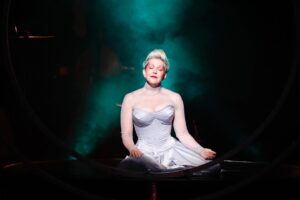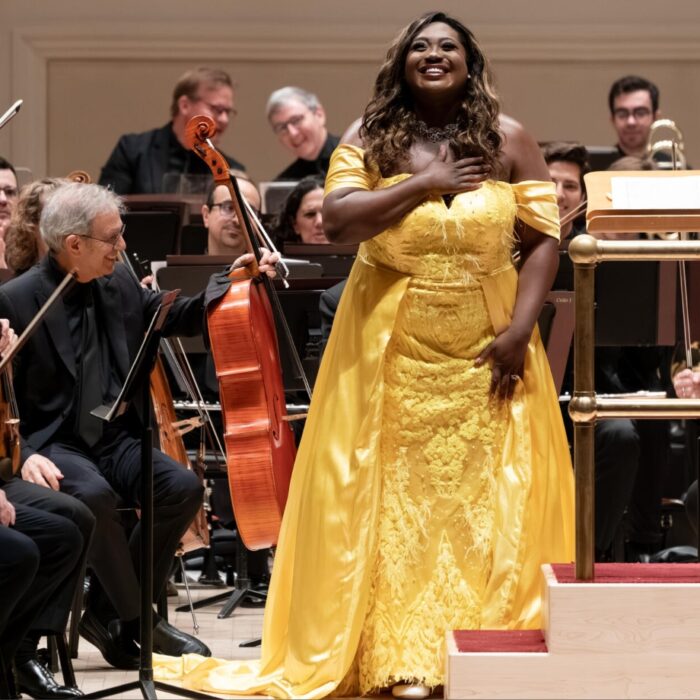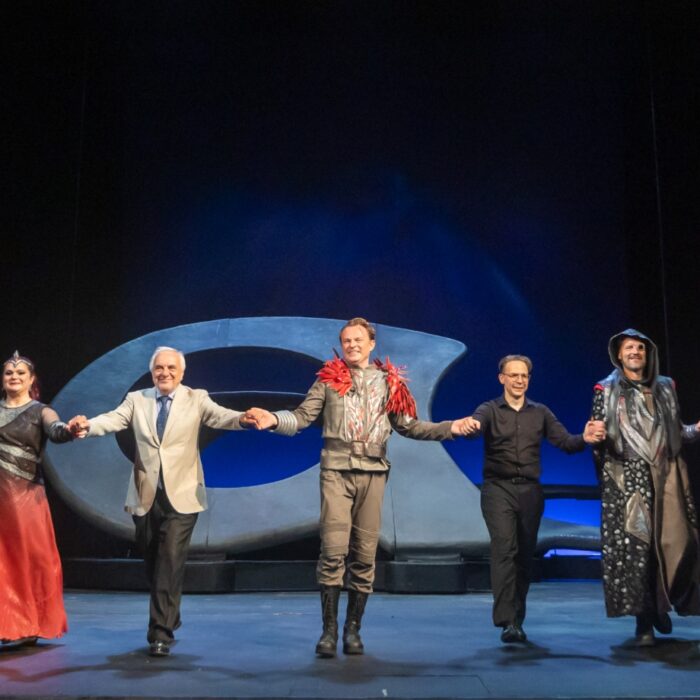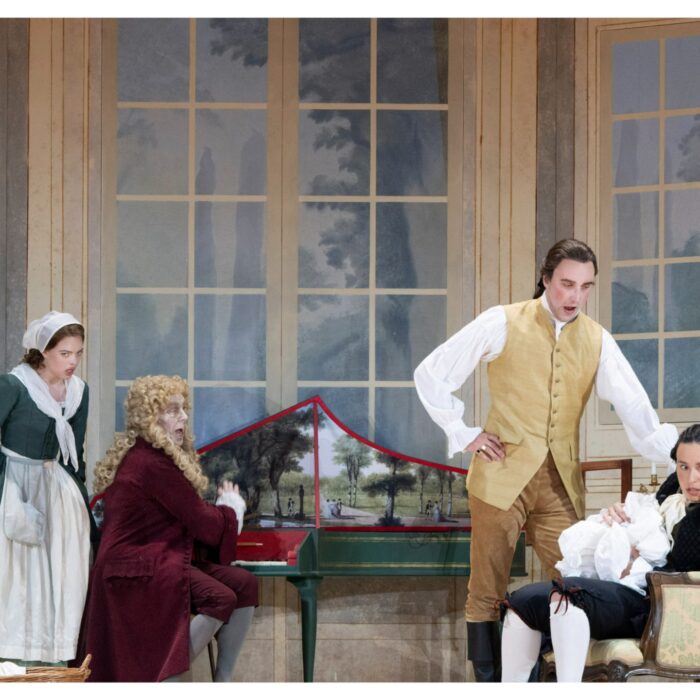
Cal Performances 2022-23 Review: EDEN
Joyce DiDonato Presents Beautiful Concert at Zellerbach Hall
By Lois SilversteinJoyce DiDonato is no ordinary opera singer. On the one hand, she is a dazzling performer with a remarkable mezzo-soprano voice. On the other, as an executive producer, she is a remarkable leader and spokeswoman for the arts. Both qualities were wonderfully evident in her 23rd performance of “EDEN.”
Continuing her “EDEN” tour across Europe and the U.S., on this night she performed at U.C. Berkeley, Zellerbach Hall. After a dramatic opening, in which DiDonato’s voice ‘appeared in the gods,’ resounding throughout the entire theater space, she made her way up onto the stage. There, she introduced us to her story about music and nature. Her striking, pale blue costume, with pink, sparkling makeup at once dazzling and lustrous, accented her, making her appear as a character from a distant and extraordinary universe. Instantly she charmed us into sharing her vision: both an intimate and far reaching perception of the world in all its facets. She began accompanied by Il Pomo d’Oro, a musical group focusing on Baroque and Classical music, under the baton of Zefira Valova, conductor and violinist. She positioned herself center stage on a small platform. Two arching and flexible chrome ‘spears’ encircled her, becoming her set, and as this fluid set transformed and reformed throughout the performance she narrated her story. What was it? Nothing less than a depiction of the world as it is and as it could be. In the ninety minutes of the performance, DiDonato created the world through a range of arias that told of musical as well as natural evolution. It was stirring.
DiDonato’s intention with “EDEN” is to direct attention to the connection between music and nature, and to show us how this connection is the essence of all life and meaning. “EDEN” is, in fact, a celebration of the birth of the world. DiDonato believes that it is essential to cultivate and forever renew that music-nature connection in order to preserve the planet. This musical creation is DiDonato’s attempt to highlight this, enable this, and allow the earth to flourish. This is the purpose of “EDEN.” Musically, dramatically, aesthetically, socially; the idea of the connection between music and nature is at the forefront. We are reminded throughout the performance of what we do not do, and what we should do, to enhance both our own life experience and our human connection both to one on-another and the earth we inhabit. Rather than experiencing the music simply for the sake of itself, we are drawn into this deeper, poignant world beyond. From Charles Ives and Rachel Portman, through Arcangelo Corelli and Aaron Copland, to Gustav Mahler, throughout “EDEN,” DiDonato weaves a fabric of sounds and ideas to assert her point. As she writes in her program notes, “”EDEN” is an invitation to return to our roots. To remember. It is an overture to contemplate the…perfection of the world around us… and to consider the depth of our connection.”
“EDEN’s” action remained circumscribed by DiDonato’s intention. Her movements were almost exclusively confined to the small podium while she narrated the growth and development required for both us and the earth to evolve. This emphasized the small place we occupy in the universe. DiDonato created a work that emphasized what appears to be missing from our lives today and causing the kind of chaos that threatens our future. She chose the music which would tell that story with passion and conviction.
She opened with Ives’ “The Unanswered Question” (1906) with all its’ original sounds and complexities, before moving directly to Portman’s “The First Morning of the World” (1921), immediately showing us the direction and the message of her program. Mahler’s “Ich atmet’ einen linden Duft” (1901) gave us a vision of the world in its earliest days when it yet contained some magic. Her movements were subtle and thoughtful as she expressed the newness and freshness of the planet. As she proceeded to take us through 17th-century Italian Baroque sound and instrumentation, DiDonato sang with varied tempi, illustrating the shifts in nature herself, from bare earth to blossoming flowers. Onward she took us, now through the 18th century with Josef Mysliveček’s aria “Toglierò le sponde al mare.” This is a piece well-known for its vocal virtuosity. DiDonato did not sing chronologically, rather she moved thematically through the repertoire. She told us of the beauty of nature with the songs of Copland and the poetry of Emily Dickinson. She emphasized poignant moments in war with the music of early Italian composers such as Giovanni Valentini and Francesco Cavalli, both known for their music’s complex harmonies. She treated us to George Handel’s “Theodora”, where she depicted the trials and perils of those worlds where conflict and adversity break human hearts, and where people’s spirits attempt to bring themselves back to strength despite it all. Finally, she returned to Mahler with her achingly beautiful “Ich bin der Welt abhanden gekommen” (1901), where she sat still and solemn in equipoise, all her story told.
The limitations of the set and the aesthetic dynamic worked exceptionally well as an idea. There was no better way to make the point than to embody it and sing it as DiDonato did, with a voice that was rich and resonant, and a musical pallet that remained large and lustrous, creamy and full throughout. The sound was often glorious, the variety and richness of her subject matched by her intelligence and thoughtfulness, and she, in the middle of all that music and all that conviction, appeared as a lovable human being, pleading with it, almost praying to it. The most beauteous piece was the Mahler which drew the performance it its’ close, where she sat and just sang. There were no needless attempts at stretching or touching: just the simple, exquisite, embodied sound.
The limitations of the set, however, also reflected some limitations placed upon the emotional significance of the pieces performed. Despite the variety of arias DiDonato sang, despite the evolution of the key ideas and the artistic intentions, some of these powerful expressions became somewhat emotionally circumscribed by themselves. So long as we stayed present in the evolution of the idea, it worked exceptionally well. Without that innate musical knowledge, however, one could be strained for attempting some sort of emotional access to the performance. DiDonato’s extensive musical knowledge and intelligence-led the way for us all, happily. She guided us through the musical landscape to consider the world from the vantage point of its birth, possibilities, detractions, and energetic revival, as well as its’ musical development, and emphasized that if we attended to its’ foundation, engaging carefully with its’ natural rhythms, we could preserve it, sustain it and bring to fruition more of its’ actual wonder. As she writes in her program, she is an incredible optimist. Her aim with “EDEN” is to invite us to enter that realm with her.
The finale was characteristic of the playfulness as well as the seriousness of “EDEN” as a whole. The Piedmont East Bay Children’s Choir, under the direction of Eric Tuan, came on and performed three pieces, one with DiDonato and two on their own, one even conducted by one of the young performers themselves. Bright, simple, warm, and nurturing, here was more of the garden which DiDonato had in mind when creating her “EDEN” to begin with. The bright voices, beauteous sounds, warm smiles, and social engagement, strengthened the narrative drive of the performance. It was clear that she aimed to fill this musical garden with many sources of inspiration and hope. As she sat in the midst of the choir, the youthful group was indeed one of the seeds DiDonato had planted. May we all flourish with them.


